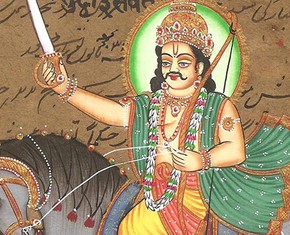The views expressed in our content reflect individual perspectives and do not represent the authoritative views of the Baha'i Faith.
Throughout human history, we’ve argued over religion. The Baha’i teachings say that kind of contention should stop.
For example: Baha’u’llah, the prophet and founder of the Baha’i Faith, proclaims that differing perceptions of the station of a prophet are permissible as long as they do not become the cause of quarrel and contention among the people who hold them.
Baha’is believe that theological beliefs should not cause strife and conflict amongst the population. Baha’u’llah unambiguously identifies the nature and purpose of religion in these words:
The Great Being saith: O ye children of men! The fundamental purpose animating the Faith of God and His Religion is to safeguard the interests and promote the unity of the human race and to foster the spirit of love and fellowship amongst men. Suffer it not to become a source of dissension and discord, of hate and enmity. This is the straight Path, the fixed and immovable foundation. – Gleanings from the Writings of Baha’u’llah, p. 215.
The Baha’i writings further assert that the presence of social discord is a sure sign that religion has disconnected from its spiritual foundation, and that God has metaphorically concealed His face from the people who use religion to wage hostility and intolerance toward humanity. Consequently, the society, which is the arena for the operation of religion, loses its sense of transcendence and degenerates into a grand scale of hypocrisy in the hands of its ecclesiastics.
One might say that Baha’u’llah, in his injunction not to contend about matters of religion, advances a critical idea—the idea that the theological conflicts among clerics may not necessarily result in practical ethics of good will. Knowing how in the past, theological differences have caused conflict and bloodshed, Baha’u’llah refuses to promote any theological fundamentalism. Instead, he advanced a culture of peace based on moral principles that guide us in how to treat other people.
Religion is spiritually sustained by its connection to God, the ultimate Reality. Yet, it operates within the world, among people and their social relationships. When the will of God is revealed to the world, it finds relative and finite expressions in the minds of people. Revelation, thus, becomes an individual experience as well as a social reality.
For example, on the night of May 22nd, 1844, when the Bab revealed Himself to Mulla Husayn, the first person to receive and embrace the Babi cause, this revelation came to Mulla Husayn like a thunderbolt that benumbed his faculties, and ultimately gave him strength and transfiguration. Yet, in all, that experience remained an individual one. On that night, Mulla Husayn did not acquire the total knowledge of God, but he did undergo a personal spiritual experience—an encounter that compelled him to go out into his society and engage in a process of revolutionary social change.
Humanity’s encounter with the word of God works in much the same way. We may establish a connection with the ultimate spiritual reality, but the real challenge of spiritual progress means translating this connection into the dynamics of civilization and social progress. Baha’u’llah teaches us that the sustaining force of social evolution is morality, the center around which concentric circles of social reality evolve. Within this context, the concept of spirituality is intertwined with one’s responsibility in carrying forward an ever-advancing civilization.
For Baha’is, even the most esoteric concept of personal salvation evolves within the context of one’s contributions to a world civilization. The concept of inner spiritual virtues—such as courage, honor, truthfulness and loyalty—represent the fusion between individual actions and the dynamics of humanity as a whole. Those virtues, according to the Baha’i teachings, move us toward a global civilization—as long as they promote the fundamental principle of the oneness of humanity.
So the Baha’i teachings, like all other religions, emphasize morality—but in far greater dimensions than just the personal. The Baha’i teachings formulate a conceptual framework that brings morality and religion into relation with the organic processes of the expansion of civilization.
For example, from the beginning of known civilization, humankind organized itself into family units, later achieved tribal solidarity, then expanded into the constitution of the city-state, to the institutions of independent and sovereign nations and now, toward the stupendous enterprise of building a united and peaceful world. In this vast historical process, one can detect various expressions of moral order, revealing humanity’s moral struggle to overcome division and conflict and realize true universality.
Baha’u’llah drew a structural parallel between the evolving rhythm of moral order, and the collective coming of age of the human race—the emancipation of humankind as it reaches its final destination of becoming outwardly and inwardly united.
This level of global unity exemplifies authentic morality. However, historically, in the absence of authentic morality, false justifications have been used to gain power or to make decadence palatable—and that false morality has often become the shared cultural belief or political philosophy of various societies.
Baha’u’llah advanced the concept of authentic morality as a framework for unity—and the removal of alienation and estrangement from the emerging civilization. This Baha’i teaching does away with any theological basis for the moral justification of conflict.
This moral authenticity gives religion a unity of purpose rather than doctrinal discord, the very cause of disunity and division in religion. Throughout history, clerics claimed to have an exclusive comprehension of divine knowledge, and thus, the moral legitimacy to rule. Baha’u’llah viewed this claim as potentially oppressive, eventually leading to sectarian violence. Throughout his ministry, Baha’u’llah annulled the Shi’i practice of taqlid, or imitation of clerics, and abrogated holy war. He abolished the institution of the priesthood and encouraged the independent investigation of truth. Instead of taqlid, Baha’u’llah emphasized the power of self-reflection and rational consensus.
Humanity is currently engaged in a race between the consciousness of global ethics, and a geopolitical catastrophe—but global ethics cannot survive on wishful thinking alone. Legitimate institutions, such as those created for collective security and the enforcement of international law are paramount for countering the raw self-interest and savagery that lurk beneath the veneer of our civilization. At the same time, the resurgence of fanatical orthodoxies promoting religious bigotry and tyranny directly threaten the international security and peace of the human race. As this religious fanaticism is currently on the rise, fueling global conflict, the world is at a crossroads: The end of religious faith, or a call for a new synthesis of faith and global ethics?
















Comments
Sign in or create an account
Continue with Googleor